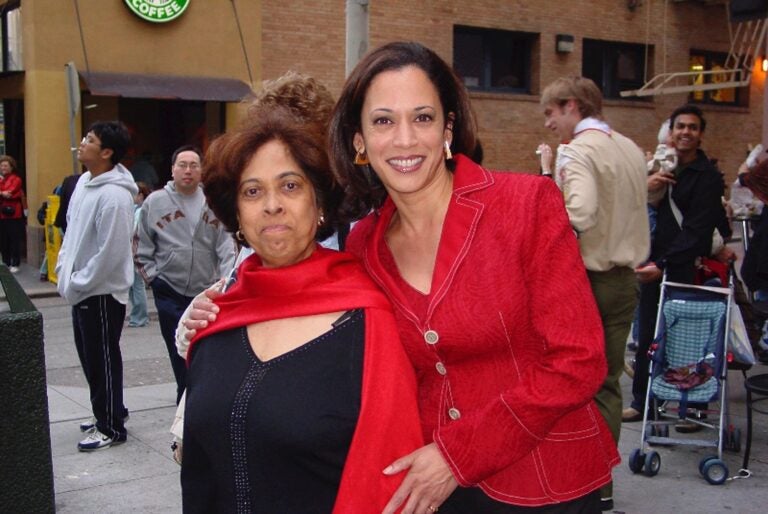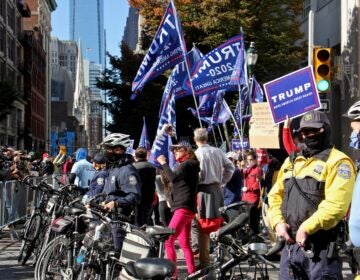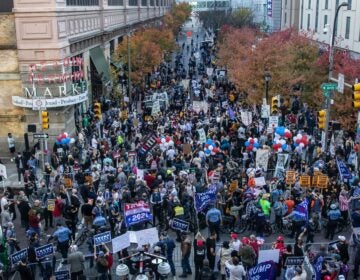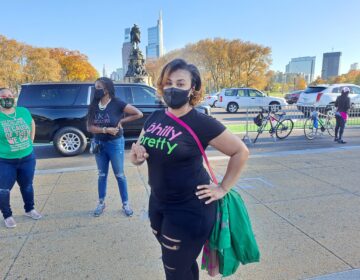Kamala Harris could help Dems court Philly’s large Indian American community
With both parties actively courting South Asian American voters, Harris' presence on the Democratic ticket could have an impact in a critical swing state like Pa.
Listen 19:14
This 2007 photo provided by the Kamala Harris campaign shows her with her mother, Shyamala, at a Chinese New Year parade. (Kamala Harris campaign via AP)
U.S. Sen. Kamala Harris is both the first Black woman and the first Asian American woman in history to join a major party presidential ticket.
Murali Balaji is a lecturer at the University of Pennsylvania whose family comes from the same part of India Harris’ does. With both parties actively courting South Asian American voters, Balaji argues Harris’ presence on the Democratic ticket could have a big impact in a critical swing state like Pennsylvania — particularly in Philadelphia and the suburbs which has one of the largest Indian American populations on the East Coast.

Hear the whole story on The Why
Interview Highlights
On his reaction to Harris as Biden’s VP pick
I was expecting the decision, but even when that announcement was made, it still felt surreal because Kamala’s family comes from the same part of India as mine. The stories from her childhood visiting India and spending time with her mother’s family mirrored a lot of my own experience when she describes going for walks with her grandfather, P.V. Gopalan. It really harkens back to the days when I would visit India and my grandfather. When she describes those walks, I literally just visualized my own walks with my grandfather … I lived that experience and that that has such a significant impact for me as an Indian American.
On the history of Indian American political engagement
Even as the Indian American population was growing, the Indian American and South Asian community as a whole was very reluctant to engage politically. There is that “model minority” stereotype, where you just keep your head down and you work hard and that’s all you need to do. But Indian Americans became more politically active, especially as they saw their numbers increase and also their voice needing to be heard on issues that especially were relevant to them, issues such as immigration, education over the last decade. Members of both parties are now actively courting the Indian American vote.
And as a result, Indian Americans are able to wield more muscle here in the Philadelphia area, where we have one of the largest populations on the East Coast. We’re seeing that in terms of the ways in which local officeholders, folks who are running for state legislative races, as well as federal races, are reaching out to the community.
On what Harris’ pick could mean for the election
I think it could get Indian American and South Asian voters who might have otherwise stayed home to go to the polls and vote. I can tell you the number of relatives I have in India who are sending me messages almost celebratory, like, “Hey, you know, a Tamil woman is now potentially going to be the next vice president of the United States.” That has significance for quite a few folks.
And it’s across generations — whether you are an immigrant, whether you’re the children of immigrants, whether you even third generation who identify with some way, shape or form with your Indian identity, that can play a role. Keep in mind that the Philadelphia and Pittsburgh suburbs and increasing the Lehigh Valley have large numbers of Indian Americans and they can play a pivotal role if, as we expect, this race is going to be close.
Donald Trump won the state of Pennsylvania by five figures in terms of the number of votes he won, but he won the presidency by less than 100,000 votes.
When you look at the margin of defeat in Pennsylvania, Wisconsin and Michigan, Pennsylvania, Florida and Texas and to a lesser extent, North Carolina, have very significant Indian American populations that could come into play as voting begins.
WHYY is your source for fact-based, in-depth journalism and information. As a nonprofit organization, we rely on financial support from readers like you. Please give today.






